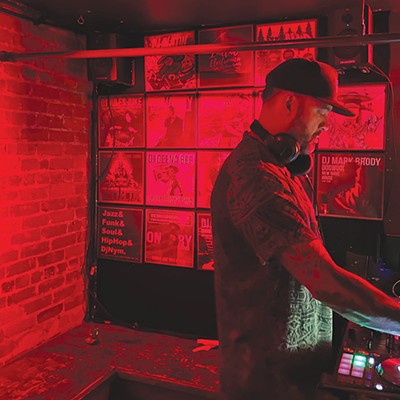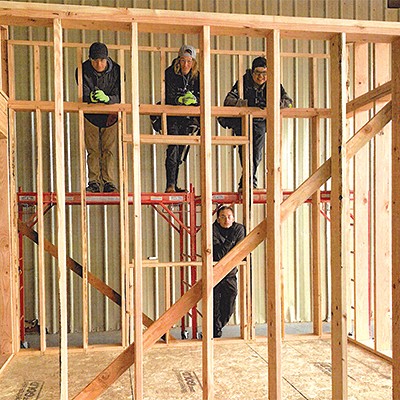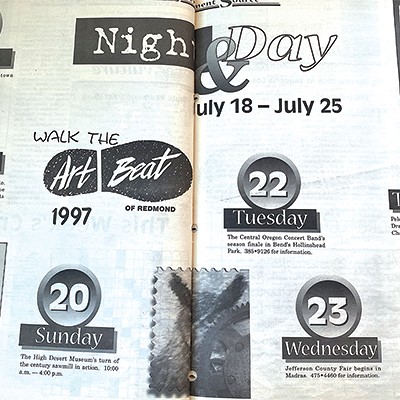It's a little after 3:30 p.m. on Thursday, June 25, and KOHD-TV General Manager Jerry Upham just learned of the news story that would dominate all U.S. media for the next week-or-so - the kind of story the 23-year TV news veteran wishes his station could break to Central Oregon viewers.
"Michael Jackson just died," Upham said. "It's showing up on the New York Times web site but nowhere else just yet." He checks the web site of KOHD's main competitor, KTVZ, the long-standing NBC affiliate owned by the News-Press & Gazette Co. of St. Joseph, Mo., to see if the story appeared on its web site yet. It had not. A couple of hours later, KOHD broadcast a man-on-the-street piece in downtown Bend with people's reaction to the news that the King of Pop was dead.
While Michael Jackson's death is about as big an American pop culture story as there is, covering it was a bit of a departure for KOHD, and it demonstrates the vulnerability of the relative newcomer as it struggles to compete against KTVZ, a station that has been broadcasting the evening news in Bend since the Carter Administration, in the nation's 18th smallest television market. The amount and quality of significant local news that can be covered by two rival news teams remains questionable at best, and with the local economy still reeling from the recession and the crash of the construction and real estate industries, it begs the question: Can KOHD remain competitive in Bend much longer, especially when there is now a third local station, KBNZ, clamoring for the same cash flow from local advertisers?
With a market this small, the real challenge from an ad revenue standpoint is qualifying your audited ratings with the geographical exclusivity of the station, said Michael Sias, principal with Lighthouse Point, Fla.-based Firm Nineteen Media Relations, a company specializing in marketing strategies for media companies.
"Viewership may be low, compared to a larger market, but the local consumer base still watches TV, and local companies still need to reach them," Sias said. "Station ad reps will have to make a stronger case for the exclusivity of the market in negotiating fees. As is the case anywhere else, network lead-in shows are a big part of it."
Unfortunately for KOHD, Nielsen ratings for the week of Aug. 10-16 find the only ABC show ranking in the Network Top 20 was "Who Wants to Be a Millionaire?" - a program that is not exactly discussed around the water cooler as often as it was when it debuted in 1999, and even so "Millionaire" is not the show leading in to either the 6 p.m. or 11 p.m. local news broadcast.
KOHD's first news cast went out across the airwaves on September 26, 2007, and at the time the parent company of Bend's ABC affiliate, Eugene-based Chambers Communications, which paid a little more than $8.5 million in 2006 to secure the license from the Federal Communications Commission to open a full-power television station, believed there would be enough advertising revenue to support two local TV news stations by dukeing it out the old fashioned way - beating the competition on breaking news stories, finding angles overlooked by KTVZ, providing high-quality programming and timely topics with newsmagazine-style shows like "KOHD News Daybreak," and pushing a full-on high definition broadcast, which was something new to the local market at the time.
That plan went into effect just before the first ripples of the recession started lapping against the local construction and real estate industries, the sectors that drove Bend's economy for much of the past decade and supplied a major source of KOHD's advertising revenue, along with regional automotive dollars from manufacturers like Northwest Dodge and the Ford Association, a cash spring that recently dried up, Upham said.
"There's no doubt the pie has shrunk compared to what it used to be," Upham said. "We've seen advertising revenue drop considerably, and the amount of local businesses that aren't able to spend what they had when times were good has made it more of a challenge for us to increase revenues."
It also resulted in KOHD having to make significant cutbacks to its staff, both on-air and behind the scenes, as well as to its programming. Upham said the station's sales manager left in recent months and KOHD decided not to fill the position. "That was a move that helped us save on expenses, but myself and others are picking up the slack," Upham said. "We have more people doing more than they were cross-trained to do before." Last April, weekend anchor/reporter Allison Martin was informed she was being laid off "along with a significant number of other on-air and behind-the-scenes staff," reports Oregon Media Central, a Blog that provides coverage of media across the state. But KOHD changed its mind, and Martin now hosts KOHD News Daybreak. A memo from Upham to KOHD staff, dated April 30, provided details of the station's plans to consolidate and eliminate existing programming (see sidebar).
"From the viewer's standpoint, they have not seen too much of a fallout," he said. "Our news ratings have continued to increase through each reporting period in 2009 and for the morning show are the highest that we've ever had. But we are still a relatively new operation, and people are still finding us. We are gaining ground every month on the air at this point." But as Upham stated in the April memo, "... increased ratings still don't make up for the shortfall in revenue that this economy is giving us ... both at the station and the company level."
Doug Spero, a professor of mass communication at Meredith College in Raleigh, N.C. who specializes in local television, said that in small markets ratings really don't come into play because stations are selling advertising spots to the furniture stores and the car dealerships, so stations that build a strong brand with a news product that injects competition into the market can usually make money, but they need to be running lean and mean.
"They need to use technology, have as few people in the control room as possible and downsize wherever they can," Spero said. "We are talking one man bands, pool coverage of events. That leads to overall poor journalism, but it gives these television stations a product.That's the upside. Here's the downside. Normally, in even mid-sized markets, it is hard for more than two news stations to survive.In fact, I would say in the next 10 years markets 80-210 (which includes Bend) will all be down to one or two stations. The problem is that their costs will outstrip the viability of the product.Can these guys do it for a while? Probably, yes, but it's a cancer that will eventually catch you."
Lean and mean is the approach being taken by Bend's new-kid-on-the-block, KBNZ. Los Angeles-based New Vision Television purchased KOIN in Portland, and saw an opportunity to split off in Bend and start a local CBS affiliate. The major attraction in doing so was satellite TV provider Dish Network's announcement that it would begin carrying the local stations on July 15 now that the market has all four major networks broadcasting in Bend (KFXO is the local FOX channel, and it is run by General Manager Chris Gallu and KTVZ staff), a prerequisite of the satellite carrier. That creates a brand new viewing audience and a new stream of advertising revenue for the Bend stations. On top of that, local broadcasters these days charge satellite and cable providers a premium to carry their programming. (Remember this past winter when BendBroadband stopped airing popular FOX programs like American Idol, House and the NFL Playoffs over a contract dispute that now has KFXO charging the cable company to receive its signal?) That creates a second guaranteed revenue stream for all four local network affiliates if deals are struck. (DirecTV also offers local channels but on a limited basis; currently it requires customers to petition to receive local programming but not everyone is granted their wish. DirecTV did not return repeated telephone calls asking about its future plans for the Bend market.)
Meanwhile, even with the economy still struggling to gain solid footing KBNZ has eight full-time employees with plans to fill positions in news, sales, and promotions in the weeks and months ahead, KBNZ General Manager Dave Ulrickson said.
"We're operating as a hub station, which many smaller stations around the country are doing right now," Ulrickson said. "We get our infrastructure from KOIN, which saves on expenses because you don't need a full department to operate. We definitely are having growing pains starting in a year when the economy is going south. Plus it's always a challenge to be something new."
Ulrickson acknowledged that New Vision's decision to go ahead with the launch of KBNZ when most local advertisers already committed to spending their money for the year created a challenging situation for the fledgling station. "They had me get a staff in place and start working the market for ad sales, and create our Central Oregon News Minute broadcast, which KOIN news injects into their newscasts as seen in Bend," Ulrickson said. "We've been accepted by the community, and we are continuing to roll out the digitalization of our signal even though we are a low-powered station. Bend is a great market and it's not going to tank for long. There is good viability with a broad business base that will continue to grow."
In the short term though the station is having its share of challenges. It hired KTVZ vet Brittney Hopper to spearhead but its local coverage, but she's already departed and there are no plans to replace her with outside talent. Instead the station is producing its one-minute "news" segments with in-house staff. And don't expect KBNZ to distinguish itself with hard hitting reporting. The station is taking un-abashedly pro-business approach, pushing "positive news" about the community.
"We are a pro-business advocate station and our Central Oregon News Minute is geared toward the business community," Ulrickson said. "There is too much news here that chases ambulances. The only way out of the downturn is to work together with businesses and provide a representation of positive things that are going on here in the marketplace. And we're also in a position to capitalize on those businesses that are smart and are trying to gain market share in this down economy. Right now we are ahead of our budget."
However, making day-to-day survival a little shakier for KBNZ was the July 13 move by its parent company, New Vision Television, owner of 14 stations across the U.S., to file for Chapter 11 bankruptcy protection in U.S. Bankruptcy Court for the District of Delaware, where New Vision is incorporated. Terms of the bankruptcy allow the conglomerate " ... to operate our business as usual," New Vision Chairman and Chief Executive Officer Jason Elkin said in a prepared statement. "(This) also marks a smooth entry into what we hope will be a short and consensual bankruptcy process that will restructure all of the company's debt and lead to the emergence of New Vision as a much stronger entity going forward." The company is still able to pay salaries and benefits, and now has access to a $28 million line of credit, which includes "exit financing," while its lenders agreed to eliminate New Vision's $400 million in debt in exchange for all of its equity.
New Vision launched in 2006 with a business plan aimed at snatching up 14 stations in a chain of small- to medium-sized markets but amassed that $400 million in debt by paying near-premium prices for each station. Court documents show that when the economy rolled off the cliff last fall, New Vision's advertising revenue, like all media, plummeted with it, its assets dropping 30 percent in value. The bankruptcy documents place the company's estimated net-from-liquidation value somewhere between $41 million and $71 million.
Bankruptcy reorganization notwithstanding, there may not be room for another "local" station in Central Oregon. Spero said when a third competitor, in this case KBNZ, moves into a small market, like Bend, it creates a situation where one of the players is most likely going to get shaken out.
"It can work (with three stations) if they can hang on, but in a market size like that it is going to be very difficult," said Spero."If I was coming in as the number three station, I don't know if I would be interested in doing news at all.There just isn't enough reward.You have to think that you're already competing with two other local television news programs on top of the Internet, cable news, newspapers and radio. That fractionalizes the advertising dollars that are in the marketplace."
KTVZ's Gallu agrees that while Bend, and the rest of the U.S., is experiencing a severe downturn the long-term potential of this market leaves room for other newscasts to gain a foothold. But when a station like KOHD comes in swinging for the fences it also risks striking out.
Upham's April Memo
"For the past month we have been examining all our options as they relate to keeping the best possible shows on the air given the direction we have been given with regard to reducing overhead. Following is a summary of the changes that will be taking place over the next 90 days:
Daybreak. Eliminating the first hour from 5-6a and replacing it with ABC Morning News. Lauren (Biskind) will produce and anchor, and Jon (Bellemore) will continue his role. We will go to three people in the booth. Lauren will no longer report on a daily basis.
M-F Evening Shows. The 5p and 6p show will become more similar, and Chris (McKee) will produce both. Andrea (Adams) will move into a multi position of co-producer, assignment desk/editor. Kioara (Bohlool) will turn a story for the shows and continue to co-anchor the 5 & 6. Sports is up in the air at this point, as we are attempting some creative ways to keep a presence. We do know that we will be unable to keep the same sports presence we have now. Again, we will go to three people in the booth.
Sat-Sun. We will be forced to eliminate weekend shows at some point to be determined, but no later than August 2nd ...
Obviously this is far from an ideal situation with regard to shows and personnel. I appreciate what everyone is doing and again regret that we have to go down this road."

























